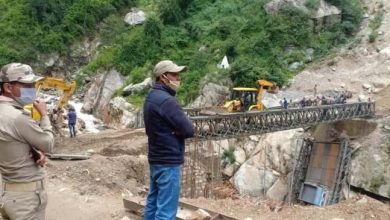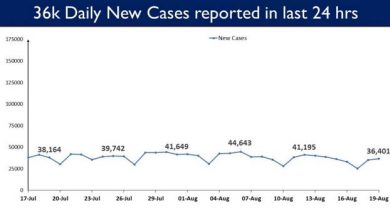Revamp education system to make students for effectively face 21st century challenges: Vice President
New Delhi: The Vice President of India, Shri M. Venkaiah Naidu has called for revamping the education system to prepare students to effectively face the challenges of the 21st century, while upholding the Indian values and ethos at the same time.
Inaugurating the Platinum Jubilee Celebrations of BHS Higher Education Society, in Bengaluru today, he wanted the New Education Policy to focus more on comprehensive history of India, apart from our rich culture and heritage. He said the history books should contain the contributions made by great freedom fighters from different parts of the country.
Shri Naidu said that our education system must make our institutions of higher learning and universities the centres of excellence with international standards.
“We need an education system that transforms a student to become a complete human being, who is sensitive to the needs of others, understands the other point of view and respects and values others for what they are,” he added.
The Vice President advised the teachers, educationists, researchers, and parents to make a study of the draft of the new education policy put forth by the government and make their suggestions to make it robust and more Indian, more equitable and inclusive.
“Policymakers and the educationists must ensure that every child receives a holistic education,” he added.
Expressing his concern over the rising cost of education, particularly and said that it was a worrisome trend. Saying that education was the fundamental requirement and it must be made affordable, he asserted that providing quality education should not be equated with costly education.
There is also a need to make it education more equitable and inclusive. Policy makers and the educationists must ensure that every child receives holistic education. “I advise all the teachers gathered here, the educationists, researchers, and parents to make a study of the draft of the new education policy and make their suggestions to make it robust and more Indian”, he added.
The Vice President also urged business associations, corporate firms, trusts, entrepreneurs and philanthropic organizations to create dedicated funds for the promotion of affordable education.
Mentioning that India was a great repository of knowledge and wisdom and once upon a time it was known as Viswa Guru, he said that India’s ancient Gurukul education system with its Guru Shishya parampara used to provide value-based and holistic education, which empowered individuals. “We must once again get back to the roots”, he added.
Shri Naidu opined that any policy or strategy to provide universal education must ensure that the vulnerable sections of our population, the women, the differently-abled and the economically weak are fully covered.
Pointing out that 65% of the Indian population was below the age of 35, the Vice President said that education plays a pivotal role in realizing the demographic dividend. He called for steps to ensure that the educated and empowered youth, the human capital of the country, weree given adequate opportunities and support, especially in terms if skilling.
Shri Naidu also advised the Government, academia and the industry bodies to join hands in implementing rigorous academic standards and in creating the necessary infrastructure.
Voicing his concern over instances of social and gender discrimination, he called for a change in the mindset of the people.
Shri Naidu also stressed the need for bridging the urban-rural divide and ensuring accessibility to affordable education to the people.
The Members of Parliament, Shri P.C. Mohan and Shri Tejasvi Surya, the President and Treasurer, BHS Higher Education Society, Shri G.V. Viswanath, the Vice President, BHS Higher Education Society, Shri N.B. Bhat, the Joint Secretary, BHS Higher Education Society, Dr. R.V. Prabhakara and other dignitaries were present on the occasion.
Following is the text of Vice President’s address:
“I am delighted to participate in the Platinum Jubilee Celebrations of BHS Higher Education Society in Bengaluru today.
I was informed that the BHS Managing Committee was created in 1942 by a group of eminent educationists and philanthropists and was registered as a non-profit body dedicated to the cause of education.
I am glad to know that the mission of the BHS Higher Education Society is to achieve excellence in education so that it becomes the prime contributor to the development of self, society and diverse human enterprise.
I tend to agree with their mission. We are aware that education is the most powerful weapon that can transform the world. It completely changes the lives of the people and empowers them. It lays the foundation for a nation’s social and economic progress. Hence, it is important to ensure that every child has access to education.
Needless to say that education plays a stellar role in protecting our democracy and ensuring the prosperity of our people.
In spite of the advances and efforts of the governments and people all over the world to make education available to everyone, millions of people are struggling for their survival and in trying to make both the ends meet. The root cause has been attributed to lack of literacy and want of proper education.
From time immemorial man’s quest for knowledge has guided mankind to shape a world of liberty, prosperity, and peace.
Our nation is a great repository of knowledge and wisdom and once upon a time was known as Viswa Guru. Our centres of learning such as Nalanda and Takshashila were world famous and knowledge-seekers from across the globe used to come and pursue their studies in those temples of learning.
Our ancient Gurukul education system with its Guru Shishya parampara used to provide value-based and holistic education, which empowered individuals.
Education is the best way to empower individuals. It is the primary driving force that helps people grow and achieve their goals. Education gives us knowledge and helps us to bring about a positive change in an individual and the society at large.
Education is not just the accumulation of knowledge from textbooks. Albert Einstein once said that education is not the learning of facts but the training of the mind to think something that cannot be learned from text books. Sometimes, asking the right questions is more important than having the right answers.
We need an education system that transforms a student to become a complete human being, who is sensitive to the needs of others, understands the other point of view and respects and values others for what they are.
We need to revamp the education system and reorient the curriculum to suit the needs of the 21st century, while upholding the Indian values and ethos at the same time. The New Education Policy must focus more on incorporating a complete and comprehensive history of India, apart from our rich culture and heritage.
There is also a need to make it education more equitable and inclusive. Policy makers and the educationists must ensure that every child receives holistic education. I advise all the teachers gathered here, the educationists, researchers, and parents to make a study of the draft of the new education policy and make their suggestions to make it robust and more Indian.
India should once again become a Vishwaguru and the hub of innovation and knowledge. For that to happen, we have to drastically revamp the education system to make our institutions of higher learning and universities the centres of excellence with international standards. The Government, the academia and the industry bodies should join hands in implementing rigorous academic standards and in creating the necessary infrastructure.
The rising cost of education, especially on the higher education front is a bit worrisome. Since education is the fundamental requirement, it must be made affordable. Providing quality education should not be equated with costly education.
I call upon business associations, corporate firms, trusts, entrepreneurs and philanthropic organizations to create dedicated funds for the promotion of affordable education.
Any policy or strategy to provide universal education must ensure that the vulnerable sections of our population, the women, the differently-abled and the economically weak are fully covered.
As all of you are aware, 65% of our population is below the age of 35 and education plays a pivotal role in realizing the demographic dividend.
We must ensure that the educated and empowered youth who are human capital of the country must be given adequate opportunities and support, especially in terms if skilling.
Today’s India is young and aspirational. We must create an environment for talent to thrive. It is the job of both policy makers and the industry to see that the youth develop skills that are crucial to survive and sustain in the 21st-century technology-dependent job market.
Students passing out of senior secondary schools, colleges and other institutions must be provided an opportunity to learn skills and be provided with certificates along with academic certification.
It is advisable to organize industry internship programs during their academic courses. The higher education curriculum should be redesigned to ensure that students have internships at an industry or a company. Practical training is more important than acquiring bookish knowledge as it would go a long way in imparting the required skills to students.
Apart from imparting the right skills to the youth, we also need to establish a symbiotic relationship between the academia and the industry for creating the necessary ecosystem for innovation to thrive. Industry also needs to play a more pro-active role and establish a strong organic link with the academic institutions.
The industry should also come forward and lend a helping hand to educational institutions, particularly in terms of creating the needed infrastructure and equipment for undertaking high-quality research.
It is heartening to know that the objective of the BHS Higher Education Society is to provide an adult-learning environment with programmes designed to be responsive to the present and future needs of individuals, community and society.
I was happy to know that their curriculum integrates traditional higher education with innovative concepts to enable the students meet the demands of a diverse community and a complex society.
I was impressed to know that the society started the RURAL EDUCATION PROJECT in 1990 at T. Narasipura, near Mysore for the benefit of rural students and the youth.
Before I conclude, I covey my best wishes and appreciation to the management and staff of the institution for their service to society.
Dear students, you must not deviate from the righteous path and remain committed to upholding ethics and morals at all times. You must always have an inquisitive mind and simply not remain complacent with the status quo.
As you step out of the portals of this institution, many of you might look for employment and many others might decide to pursue further studies. Irrespective of what you propose to do, one thing is clear—opportunities are aplenty and make yourself capable of utilizing these opportunities to the fullest possible extent. I am sure that all of you will have bright and fulfilling careers.




